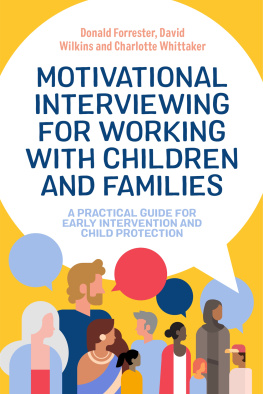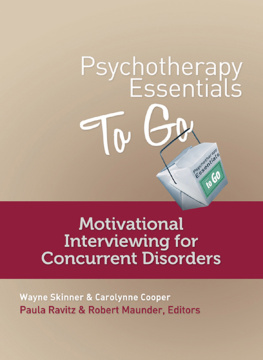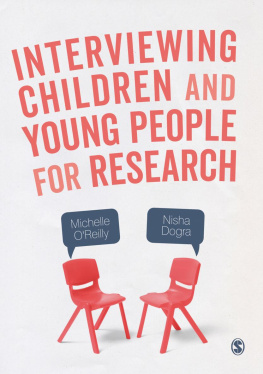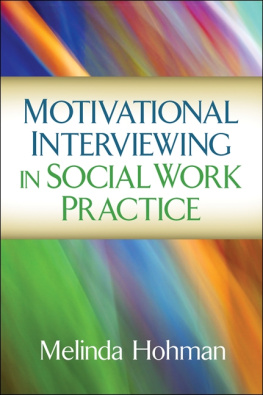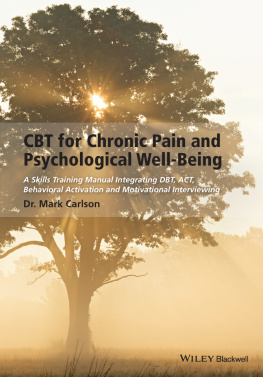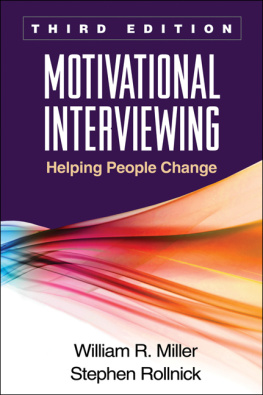Forrester Donald - Motivational Interviewing for Working with Children and Families
Here you can read online Forrester Donald - Motivational Interviewing for Working with Children and Families full text of the book (entire story) in english for free. Download pdf and epub, get meaning, cover and reviews about this ebook. year: 2021, publisher: Jessica Kingsley Publishers, genre: Home and family. Description of the work, (preface) as well as reviews are available. Best literature library LitArk.com created for fans of good reading and offers a wide selection of genres:
Romance novel
Science fiction
Adventure
Detective
Science
History
Home and family
Prose
Art
Politics
Computer
Non-fiction
Religion
Business
Children
Humor
Choose a favorite category and find really read worthwhile books. Enjoy immersion in the world of imagination, feel the emotions of the characters or learn something new for yourself, make an fascinating discovery.
- Book:Motivational Interviewing for Working with Children and Families
- Author:
- Publisher:Jessica Kingsley Publishers
- Genre:
- Year:2021
- Rating:4 / 5
- Favourites:Add to favourites
- Your mark:
- 80
- 1
- 2
- 3
- 4
- 5
Motivational Interviewing for Working with Children and Families: summary, description and annotation
We offer to read an annotation, description, summary or preface (depends on what the author of the book "Motivational Interviewing for Working with Children and Families" wrote himself). If you haven't found the necessary information about the book — write in the comments, we will try to find it.
Motivational Interviewing for Working with Children and Families — read online for free the complete book (whole text) full work
Below is the text of the book, divided by pages. System saving the place of the last page read, allows you to conveniently read the book "Motivational Interviewing for Working with Children and Families" online for free, without having to search again every time where you left off. Put a bookmark, and you can go to the page where you finished reading at any time.
Font size:
Interval:
Bookmark:

Motivational Interviewing
for Working with
Children and Families
A PRACTICAL GUIDE FOR EARLY
INTERVENTION AND CHILD PROTECTION
Donald Forrester, David Wilkins
and Charlotte Whittaker

An important feature of this book is that most of the examples we use are real social workers meeting parents which we recorded as part of research studies. We believe that this makes the book far richer and closer to practice than it would be if it was based on made-up or imagined meetings (Hall and White 2005). Here we just wanted to clarify the situation in relation to the examples we use.
Most of the examples we used were meetings between parents and social workers. Some were meetings between a social worker and an actor playing a parent. These are called simulated interviews. Simulated interviews can be useful for seeing how different social workers approach the same meeting. For instance, in we present very different approaches to the same scenario with real meetings it is not possible to see how it might have gone differently.
We had consent to use the recordings we made from both workers and parents and, in a few instances and when appropriate, young people. We have changed or left out any potential identifying details, so all presented interactions are anonymised.
Although we have tried to use real examples, this has not always been possible. So we have also imagined parts of conversations. These are usually short interchanges to demonstrate a particular point. We have also used a few case study examples from our practice experience. These have been changed so that no family or individual could be identified from them.
As most of our examples are based on real interviews, we do not always specify this in the text real interviews are the default. Where it is a simulated interview or an imagined interchange, we indicate this in the text.
This book is concerned with one apparently simple but actually very complicated question: how can we talk to people in helpful ways? And, in particular, how can we have helpful conversations in the context of child and family social work, when there might be serious concerns about a childs safety?
Our motivation for writing the book comes from two sets of experiences. We have all worked in frontline child protection work. We experienced the enormous challenges of the work, as well as the sense of satisfaction when we did help a child or a family. Yet we felt that too often we were not helping people we were trying to, but did not have a clear theory and practice for making a difference.
We then moved into teaching and research, and our second motivation was discovering that we were not alone. Not having a clear sense of how to do the work, or why to do it in particular ways, was normal. There was widespread hunger for better guidance on how to do this incredibly difficult job.
In particular, there was remarkably little detailed consideration of how to have difficult conversations, such as ones in which you have to raise serious concerns. Many social work theories agree that relationships between workers and parents and children are incredibly important, yet they tend to provide limited guidance on how to develop such relationships in this context. A particularly important challenge is that most of these ideas are borrowed from therapeutic conversations. There seemed to be much less written about how to have difficult conversations how to raise serious concerns or explain you are going to take action such as starting care proceedings. Yet this type of conversation was the bread and butter of our practice experience. To be useful, it seems to us, any approach to communication in this context has to help us have these conversations in a more constructive way.
In trying to understand better how to do this central element of the work, we were drawn to motivational interviewing. Three things attracted us. First, the values of respect and empathy were consistent with those that brought us into this work. As we discuss in the next chapter, motivational interviewing comes from a humanist perspective that has made many of the most important contributions to how we can understand and help people. Its values, theoretical orientation and theories are a good fit for social work.
Second, motivational interviewing provides a detailed description of why change is often difficult and how we can help people to change difficult behaviours. In particular, a central concern was understanding and working with resistance which can be any form of non-cooperation, from threats to responding passively in a conversation. This seemed a really helpful focus for any approach in social work with children and their families, because a high proportion of families are resistant to the involvement of statutory child protection services. Motivational interviewing helps us understand why and makes suggestions for what we can do about it.
Finally, motivational interviewing has a strong evidence base indeed, it has had many hundreds of studies. This is important because the evidence base suggests that motivational interviewing tends to work: people find it helpful and it is particularly good for engaging people in services. We are less confident that some other popular approaches in social work have this sort of evidence base. Yet this evidence does not simply tell us that it works. Just as importantly, it helps us understand its limitations. Motivational interviewing does not claim to be some sort of magic wand that can always create change. It is a detailed, evidence-based and ethical theory that describes key practices that make change more likely.
Motivational interviewing was not developed for child and family work. It originated in working with alcohol problems and has been used with a wide variety of behaviour-change issues. It was then adapted to situations where the helper has a position of power, such as a probation or prison officer. We have researched motivational interviewing in child and family work extensively over the last 20 years and tried to think about how it can be used and adapted for this setting.
This book is an attempt to share our learning from practice, research and teaching hundreds of people motivational interviewing over the last 20 years. Throughout, we have tried to make most of the examples relate to the realities of practice in childrens services (although sometimes it has been useful to consider what a counsellor might say in a similar situation). In particular, we are fortunate to have recorded a lot of conversations in which workers meet parents and young people. This book benefits from using real examples of social workers having these conversations throughout; as discussed in the note at the beginning, extracts are anonymised and used with the consent of those who took part. We hope that being able to read how real social workers dealt with often difficult conversations will bring the book to life for you, and make thinking about how to apply the skills feel more real and grounded in practice.
The book is divided into three main parts.
Part One consists of five chapters which provide a basic introduction to what motivational interviewing is and how to do it. Throughout, we use examples from child and family work; however, the principles and skills we discuss are ones that apply across different settings. we present approaches to giving advice and information from an MI perspective, both because this is an important part of everyday practice and also because it allows us to introduce key concepts for child and family work such as directiveness and dialogue.
Font size:
Interval:
Bookmark:
Similar books «Motivational Interviewing for Working with Children and Families»
Look at similar books to Motivational Interviewing for Working with Children and Families. We have selected literature similar in name and meaning in the hope of providing readers with more options to find new, interesting, not yet read works.
Discussion, reviews of the book Motivational Interviewing for Working with Children and Families and just readers' own opinions. Leave your comments, write what you think about the work, its meaning or the main characters. Specify what exactly you liked and what you didn't like, and why you think so.

